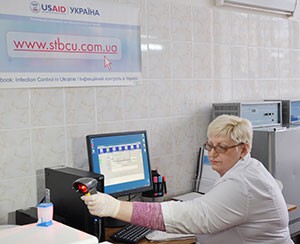- What We Do
- Agriculture and Food Security
- Democracy, Human Rights and Governance
- Economic Growth and Trade
- Education
- Ending Extreme Poverty
- Environment and Global Climate Change
- Gender Equality and Women's Empowerment
- Global Health
- Water and Sanitation
- Working in Crises and Conflict
- U.S. Global Development Lab

Ukraine's Odesa Oblast (region) has one of the highest tuberculosis (TB) and TB/HIV co-infection burden in the country. The situation is complicated by the spread of drug resistance. In 2014 alone, 674 new multidrug-resistant tuberculosis (MDR-TB) cases were detected in the oblast. The molecular diagnostic technique GeneXpert provides rapid and reliable detection of these difficult cases. The availability of this technology is especially crucial for people living with HIV (PLHIV), whose lives can often only be saved with a timely diagnosis.
Prior to 2014, the only GeneXpert machine in the oblast could not cope with growing diagnostic volume. In addition, local health providers often had low awareness of early TB symptoms, which contributed to an average treatment delay of 125 days.
"We understood the limitation of our existing equipment, and at the same time we realized that the most sophisticated technique is useless unless proper and fast patient referrals processes are in place," commented Dr. Svitlana Yesypenko, deputy head of the oblast TB facility.
So Odesa officials looked to USAID for help. The USAID Strengthening Tuberculosis Control in Ukraine project purchased an additional GeneXpert machine for the region and simultaneously worked with healthcare providers to streamline the patient pathways for PLHIV. With USAID support, the oblast TB facility organized screening processes for TB symptoms and rapid HIV testing at the primary healthcare center to accelerate referrals for TB diagnosis and treatment.
"Using a simple screening questionnaire helps select people with TB symptoms who require TB testing," explains Dr. Yesypenko. "Thanks to USAID, we are able to immediately refer these patients for GeneXpert testing. Previously, we used less sensitive diagnostic techniques and often the TB remained undiagnosed. When a person felt worse and sought medical care again, the second test would ultimately appear positive, but it could be too late for a patient. Now one-fourth of HIV-positive patients with MDR-TB are detected thanks to this new procedure. We would not have been able to detect their TB if we had used our previous approaches."
An additional benefit for patients is that from now on they do not need to visit a specialized AIDS center to get HIV testing. During the last year, 20 percent of TB/HIV patients received their TB and HIV diagnostics immediately upon seeking medical care at primary healthcare clinics.
"Our patients today are lucky, although most of them are not aware of this," says Dr. Yesypenko. "They don't know that diagnostic procedures that now only take 21 days would have taken them 125 days a year ago. More available GeneXpert diagnostics and proper referrals have resulted in a six-fold decrease in diagnostic time. For HIV-positive people with drug-resistant TB this difference often determines if they die or live."
This story is used with permission from the Strengthening Tuberculosis Control in Ukraine Project.







Comment
Make a general inquiry or suggest an improvement.